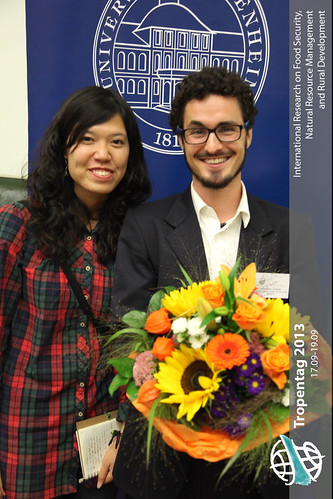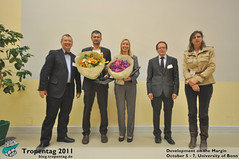Hans H. Ruthenberg Award for Graduates
Can hybrid rice feed the world?
Wed, 09/18/2013 - 13:05 — Minette Flora M...
“The adoption of hybrid rice as an agricultural innovation can have a positive impact on food security”, says Till Ludwig, this year’s awardee of the prestigious Hans Ruthenberg Award for graduates. Although population is projected to increase dramatically in the future years consequently affecting the supply in food insecure areas, he added that its adoption can improve the rice consumption per capita between 0.17% and 7.62% especially in countries that are dependent on rice as a staple food crop.
The research entitled “Impact of Hybrid Rice on Food Security. A Spatial Partial Equilibrium Analysis of Global Adoption and Diffusion of Hybrid Rice Varieties” has been taken seriously by scientists and its substantial impact have made it to be accepted for publication in the International Rice Research Institute. However, Till cautioned that it is a consumer oriented research. Looking at the production system of hybrid rice, the disadvantages still outweighs the benefits, and one should take into account that the bulk of rice consumers are in fact smallholder rice producers.
I Have A Dream – Dialogue with Christian Andres
Wed, 09/18/2013 - 09:22 — Louisa Wong
Christian Andres – a young scientist and a specialist on yam – a native plant in West Africa, is one of the 3 award winners of the Hans H. Ruthenberg Award for Graduates. This is a prestige award in the academia of agriculture for diploma or master thesis that contribute on food security research and reduction of poverty in developing countries. He is now working as a research assistant for production system at the Research Institute for Organic Agriculture (FiBL). Chritian wrote his master thesis at ETH Zurich about fertilization of Yam with poultry manure and its effects on nutrient dynamics and nutrient use efficiency.


2 MSc Graduates from the University of Hohenheim wins the prestigious Hans H. Ruthenberg Award
Thu, 10/04/2012 - 15:18 — Minette Flora M...
Lilli Scheiterle’s MSc thesis entitled “Opportunities and Challenges in the Production of Maize in Northern Ghana”and Athena Birkenberg’s “Forest Access and Governance: A Case Study on Karen Community Forestry in Chiang Mai Province, Northern Thailand”, both graduates from the University of Hohenheim wins the Hans H. Ruthenberg Award for Graduates 2012. This award is given to excellent young scientists whose topics are 1) highly relevant and discussed, 2) innovative which uses new methodological and theoretical trends in research, 3) sound and has a critical analysis of the data, and 4) a policy relevance of the recommendations specifically to developing countries.
Part 2: Interview with Athena Birkenberg
How do you feel right now?
I am really honored and I felt even more honored after the laudation because I just realized what the award really means and the reasons why the award was given to me.
What were the challenges you faced in the field?
2 MSc Graduates from the University of Hohenheim wins the prestigious Hans H. Ruthenberg Award
Thu, 10/04/2012 - 15:12 — Minette Flora M...
Lilli Scheiterle’s MSc thesis entitled “Opportunities and Challenges in the Production of Maize in Northern Ghana”and Athena Birkenberg’s “Forest Access and Governance: A Case Study on Karen Community Forestry in Chiang Mai Province, Northern Thailand”, both graduates from the University of Hohenheim wins the Hans H. Ruthenberg Award for Graduates 2012. This award is given to excellent young scientists whose topics are 1) highly relevant and discussed, 2) innovative which uses new methodological and theoretical trends in research, 3) sound and has a critical analysis of the data, and 4) a policy relevance of the recommendations specifically to developing countries.
Part 1: Interview with Lilli Scheiterle
How do you feel right now?
I am honored. I was very excited on stage when I was presenting while at the same time challenged with the vast number of people in the auditorium. It is my first time to have this so much crowd. I still feel very happy until now.
What were the challenges you faced in the field?
There are phases where you ask yourself, “Am I doing the right thing? Is my research useful? Will my data be used statistically?” . There are moments where you doubt – but you have to make a decision – stand by that decision and justify why you do it.
What is the benefit of the award to you? Any plans for a PhD?
TIPS TO WIN AN AWARD REVEALED: Reginald Guuroh shows you HOW!
Wed, 09/19/2012 - 12:10 — Minette Flora M...
“The choice of a research topic and the quality of the work for an MSc thesis are the main reasons why I was given the Hans H. Ruthenberg Award for Best Graduate Thesis in 2012”, says Reginald.
Reginald from Ghana, has been awarded the prize for his research entitled “Contribution of Home Gardens to Household Income Generation in Burkina Faso (A Case Study of Bieha District).
“Working with smallholder farmers in one of the most food insecure countries in the world like Burkina Faso has caught the attention of the award giving body”, he added. “I think employing both qualitative and quantitative research is necessary in order to capture the complex problems in the field”, he continued.
In his opinion, the ability to analyze the data properly, answer the research questions and adequately discuss the findings of the research convinced his supervisors to give him this mark of 1.3 which was a minimum criteria for the award.
Now, Reginald is a PhD candidate in Bonn, working on Range land ecology in West Africa on the WASCAL project (www.wascal.org).
 Photo with Reginald Guuroh (right)
Find the interview of the other awardees:
Athena Birkenberg http://blog.tropentag.de/node/245
Lilli Scheiterle http://blog.tropentag.de/node/244
Photo with Reginald Guuroh (right)
Find the interview of the other awardees:
Athena Birkenberg http://blog.tropentag.de/node/245
Lilli Scheiterle http://blog.tropentag.de/node/244
 Photo with Reginald Guuroh (right)
Find the interview of the other awardees:
Athena Birkenberg http://blog.tropentag.de/node/245
Lilli Scheiterle http://blog.tropentag.de/node/244
Photo with Reginald Guuroh (right)
Find the interview of the other awardees:
Athena Birkenberg http://blog.tropentag.de/node/245
Lilli Scheiterle http://blog.tropentag.de/node/244
Research in Africa Wins Award
Wed, 10/05/2011 - 18:29 — De-Registered User
Andrea Bues and William Leiser win the Hans H. Ruthenberg-Graduate- Award 2011.
 Bues was awarded 2500 Euros for her master thesis work in Ethiopia, which focused on institutional analysis of agricultural foreign direct investment, water rights and conflicts. A student of Humbolt University, Berlin, Bues' research was able examine how access to water resources can contribute to alleviating poverty.
Leiser from University of Hohenheim, won 2500 Euros for his work in Mali. He studied the variation for adaptation of sorghum to low phosphorous soils. His research is an effective contribution towards the reduction of hunger and improvement of food security.
This award is given by the Fiat Panis Foundation. This year's jury members comprised of Prof. Tilman Brueck (Humboldt-University of Berlin), Prof. Ulrike Grote (University of Hannover) and Prof. Joachim Sauerborn (University of Hohenheim). The jury decided the award based on scientific excellence, innovation and applicability.
(By : Priyanka Parvathi and Divya Rajeswari Swaminathan)
Bues was awarded 2500 Euros for her master thesis work in Ethiopia, which focused on institutional analysis of agricultural foreign direct investment, water rights and conflicts. A student of Humbolt University, Berlin, Bues' research was able examine how access to water resources can contribute to alleviating poverty.
Leiser from University of Hohenheim, won 2500 Euros for his work in Mali. He studied the variation for adaptation of sorghum to low phosphorous soils. His research is an effective contribution towards the reduction of hunger and improvement of food security.
This award is given by the Fiat Panis Foundation. This year's jury members comprised of Prof. Tilman Brueck (Humboldt-University of Berlin), Prof. Ulrike Grote (University of Hannover) and Prof. Joachim Sauerborn (University of Hohenheim). The jury decided the award based on scientific excellence, innovation and applicability.
(By : Priyanka Parvathi and Divya Rajeswari Swaminathan)
 Bues was awarded 2500 Euros for her master thesis work in Ethiopia, which focused on institutional analysis of agricultural foreign direct investment, water rights and conflicts. A student of Humbolt University, Berlin, Bues' research was able examine how access to water resources can contribute to alleviating poverty.
Leiser from University of Hohenheim, won 2500 Euros for his work in Mali. He studied the variation for adaptation of sorghum to low phosphorous soils. His research is an effective contribution towards the reduction of hunger and improvement of food security.
This award is given by the Fiat Panis Foundation. This year's jury members comprised of Prof. Tilman Brueck (Humboldt-University of Berlin), Prof. Ulrike Grote (University of Hannover) and Prof. Joachim Sauerborn (University of Hohenheim). The jury decided the award based on scientific excellence, innovation and applicability.
(By : Priyanka Parvathi and Divya Rajeswari Swaminathan)
Bues was awarded 2500 Euros for her master thesis work in Ethiopia, which focused on institutional analysis of agricultural foreign direct investment, water rights and conflicts. A student of Humbolt University, Berlin, Bues' research was able examine how access to water resources can contribute to alleviating poverty.
Leiser from University of Hohenheim, won 2500 Euros for his work in Mali. He studied the variation for adaptation of sorghum to low phosphorous soils. His research is an effective contribution towards the reduction of hunger and improvement of food security.
This award is given by the Fiat Panis Foundation. This year's jury members comprised of Prof. Tilman Brueck (Humboldt-University of Berlin), Prof. Ulrike Grote (University of Hannover) and Prof. Joachim Sauerborn (University of Hohenheim). The jury decided the award based on scientific excellence, innovation and applicability.
(By : Priyanka Parvathi and Divya Rajeswari Swaminathan)




